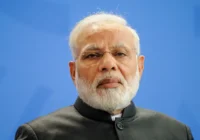The Wall Street Journal reports on the Indian government’s intention to clamp down on social platforms that have played a role in the recent farmers’ protests. According to Wall Street Journal sources, Narendra Modi’s government has threatened to jail employees of Facebook, WhatsApp and Twitter “as it seeks to quash political protests and gain far-reaching powers over discourse on foreign-owned tech platforms.”
The article claims that this initiative constitutes the government’s response to the foreign tech companies’ refusal “to comply with data and takedown requests from the government related to protests by Indian farmers that have made international headlines.” In other words, the Indian government wishes to control the content that may be allowed to appear on these platforms.
Why Are India’s Farmers Protesting?
But we also learn that it isn’t simply the response to a specific event, such as the farmers’ protests, but a matter of principle. It involves rewriting the rules of India’s democracy. “The rules would also compel companies to remove content that undermines security, public order and ‘decency of morality,’” The WSJ reports.
Today’s Daily Devil’s Dictionary definition:
Undermine:
Express ideas or facts that, however sincere truthful, are deemed dangerous because they challenge a government’s official narrative, the only one permissible for public dissemination.
Contextual note
Since the beginning of the “global war on terror” in 2001, governments across the world have regularly appealed to the theme of “national security,” applying it to oppose anything that might vaguely embarrass them. Prime Minister Modi’s government has boldly added the much broader categories of “public order” and “decency of morality” to the mix. States in the past that have actually managed to accomplish that kind of behavioral control have generally been referred to as fascist. While it may seem abusive to apply that term to any democratically elected government today, the similarity of such policies with those practiced by fascist regimes from the past should be obvious.
Nations that seek to apply such policies today should only deserve to be called “aspirationally fascist.” Given the availability of communication technology to even the humblest among us, the effective repression of expression and enforcement of morality applied to an entire population would immediately undermine any nation’s pretension of democracy. We should ask ourselves if Modi is serious in his demands. The difficulty of achieving those goals in the era of global platforms appears to be insurmountable. If it were to succeed, it would imply dismantling one of the givens of the globalized economy and the stoutest pillar of any democracy: the free circulation of ideas.
In its reporting on the same topic, Business Insider focuses on the immediate challenge to the Indian government represented by the farmer protests. It describes the government’s initiative as an attempt “to pressure the firms into sharing data related” to the protests. If this is true, the aim would no longer appear to be the mere prevention of unfavorable discourse disseminated through the media. It would imply the harnessing of data produced by these foreign platforms for surveillance purposes. That would then serve the state to crack down on elements suspected of subversion or threatening the public order.
This would seem to contradict the idea that the government’s aim is simply to censor subversive ideas. Instead, its aim would be to partner with the social platforms to gain access to their data and metadata. This would serve, not to suppress certain ideas, but to suppress the people who express those ideas.
Modi may simply be casting his lines in all directions at the same time, unconcerned with the type of fish he may reel in. It could be compared to the Trumpian foreign policy notion of “maximum pressure” to make the adversary bend. In Modi’s case, it is directed at the platforms to convince them to take some action that he finds acceptable — it doesn’t really matter which. He appears to be giving his victims the choice between applying his criteria of censorship, which means banning specific content, or quietly handing him the data they collect, which will make it possible for India to identify and punish the culprits. At the same time, by personally threatening the employees of the platform, Modi is showing that he means business, much like Donald Trump and Mike Pompeo when they imposed sanctions on the officials of the International Criminal Court to discourage them from investigating the US and Israel.
The WSJ reveals the deeper ambitions of the Indian government concerning the surveillance of social media. It cites a member of the government who “said the rules would require platforms to track and store records of specific messages as they traveled among users.” This would have radical implications, defining user privacy in the use of social platforms as a relic of the past. The threats against employees of the platforms demonstrate the conclusion The WSJ has reached: “The Indian government appears ready for a fight.”
Historical Note
Narendra Modi’s government appears to see this as a possible historical turning point. India’s rivalry with China, at least in terms of soft power, has been defined in many people’s minds as the contest between the world’s two powerful but highly contrasted nations that can be called billionaires (in terms of population). One is an autocracy and the other a democracy. One ambiguously carries the heritage of Western colonization; the other defies it.
Seen as competition, it has turned out not to be a truly fair fight. China has obviously been progressing exponentially in its economic and military influence, whereas India seems to be handicapped by its confusing democratic institutions and traditions, coupled with its incomprehensible and ungovernable demography. The traditionally conflictual relationship that has prevailed between the two nations has recently been exacerbated not just by India’s unfocused economic orientations — illustrated by the complexity of the debate around the farmers’ protests — but also with regard to contested borders, where some recent skirmishes have taken place.
The WSJ article offers a curious hint that Modi’s government may be seeking to emulate China: “The big difference between the earlier history and where we are now is that China has done just fine without those companies.” Coming from Modi’s government, this sounds either like an expression of envy or the resolution to mobilize all its forces to go to battle with the social platforms, applying the logic of China which has peremptorily curtailed their freedom to operate.
The fact that Facebook and Twitter are banned in China has enabled the emergence of Chinese non-global equivalents such as Weibo and Renren. Modi would appear to be dreaming that something similar could take place in India, though the government’s ability to control what happens on such networks as effectively as the Chinese seems more than unlikely. Modi may simply be citing the Chinese case to frighten the American owners of the dominant platforms.
The WSJ presents Modi’s gambit as a negotiating stance. The prime minister believes he is in a position to “threaten the tech companies’ future in a market of more than 1.3 billion people that, since they are locked out of China, is the key to their global growth.” The article cites Jason Pielemeyer, the policy director of the Global Network Initiative, focused on human rights: “In a market the size of India, it’s hard to take the nuclear option, which is to say, ‘We’re not going to comply, and if you block us, we’ll call your bluff or accept the consequences.’”
At the same time, The WSJ reveals what may be the truly “noble” underlying motive of the Indians, one we should all applaud. It’s a motive that sounds far more generous and respectful than either threats against American tech companies or the desire to emulate China’s policy of social control. “Officials have said the government wants to protect small Indian businesses, secure user data and allow room for India’s own tech firms to grow,” The Journal reports.
So, which one is it: the emulation of China’s surveillance society and despotic control of the media or a democratic encouragement of small businesses? Because India is a democracy, all that will only become clear in the next election, in 2024. Only three years to wait for the moment of clarity. Isn’t that what democracy is all about, waiting for the next election in the hope that the truth will then become manifest?
*[In the age of Oscar Wilde and Mark Twain, another American wit, the journalist Ambrose Bierce, produced a series of satirical definitions of commonly used terms, throwing light on their hidden meanings in real discourse. Bierce eventually collected and published them as a book, The Devil’s Dictionary, in 1911. We have shamelessly appropriated his title in the interest of continuing his wholesome pedagogical effort to enlighten generations of readers of the news. Read more of The Daily Devil’s Dictionary on Fair Observer.]
The views expressed in this article are the author’s own and do not necessarily reflect Fair Observer’s editorial policy.
Support Fair Observer
We rely on your support for our independence, diversity and quality.
For more than 10 years, Fair Observer has been free, fair and independent. No billionaire owns us, no advertisers control us. We are a reader-supported nonprofit. Unlike many other publications, we keep our content free for readers regardless of where they live or whether they can afford to pay. We have no paywalls and no ads.
In the post-truth era of fake news, echo chambers and filter bubbles, we publish a plurality of perspectives from around the world. Anyone can publish with us, but everyone goes through a rigorous editorial process. So, you get fact-checked, well-reasoned content instead of noise.
We publish 2,500+ voices from 90+ countries. We also conduct education and training programs
on subjects ranging from digital media and journalism to writing and critical thinking. This
doesn’t come cheap. Servers, editors, trainers and web developers cost
money.
Please consider supporting us on a regular basis as a recurring donor or a
sustaining member.
Will you support FO’s journalism?
We rely on your support for our independence, diversity and quality.






